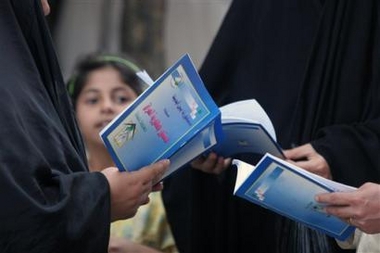|
Groups hold negotiations on Iraqi charter
(AP)
Updated: 2005-10-10 17:15
With U.S. mediation, Shiite Muslim and Kurdish officials negotiated with
Sunni Arab leaders Sunday over possible last-minute additions to Iraq's proposed
constitution, trying to win Sunni support ahead of next weekend's crucial
referendum.
But the sides remained far apart over basic issues — including the federalism
that Shiites and Kurds insist on, but that Sunnis fear will lead to the
country's eventual break-up. And copies of the constitution were already being
passed out to the public.
Though major attacks in the insurgent campaign to disrupt the referendum have
waned in recent days, violence killed 13 Iraqis Sunday.
In one attack, masked gunmen in police commando uniforms burst into a school
in the northern town of Samarra, pulled a Shiite teacher out of his classroom
and shot him dead in the hallway as students watched from their desks, police
said. A suicide car bomb killed a woman and a child in the southern city of
Basra.

An Iraqi child looks on as women hold copies
of the country's draft constitution in Baghdad, Iraq, Sunday, Oct. 9
2005.[AP] | A U.S. Marine was killed by a roadside bomb in the town of Ramadi, west of
Baghdad, on Saturday, the military announced. It was the ninth American death
during a series of offensives waged in western Iraq seeking to knock al-Qaida
militants and other insurgents off balance and prevent attacks during Saturday's
national vote on the constitution.
The death brought to 1,954 the number of U.S. military personnel who have
died since the beginning of the Iraq war in March 2003, according to an
Associated Press count.
Interior Minister Bayan Jabr told an Arab newspaper it will take five years
to put down Iraq's insurgency. He said Iraq's security forces only carry rifles
"while the terrorists possess all kinds of advanced weapons."
"Be patient with us for five years before restoring security and the state's
respect," Jabr said in an interview with the London-based Sharq al-Awsat
newspaper.
Jabr said the number of foreign militants involved in Iraq's insurgency had
fallen to around 900, from as many as 3,000 three months ago.
Their ranks have fallen because of deaths inflicted by U.S. and Iraqi
military offensives — but also because al-Qaida in Iraq has started sending
fighters to other Arab nations to build terror networks there, Jabr told the
newspaper.
As Sunni-led insurgents staged attacks to discourage Iraqis from voting in
the referendum, the government launched a campaign to persuade Iraqis to go to
the polls despite the threats — and despite calls by some Sunni Arab leaders for
a boycott.
"We think (a boycott) would weaken Iraq because the only way that Iraq can
recover is done by concentrating on the political process, writing the
constitution and participating in it," government spokesman Laith Kubba said.
"Any act that calls for violence or boycotting would deviate the country from
its course."
Many Sunni Arab leaders are calling on their followers to turn out in force
to vote in the referendum — but to vote "no" to defeat a draft they say will
break Iraqi into pieces, with Shiite and Kurdish mini-states in the north and
south and the Sunni minority left poor and weak in a central zone.
Though a minority, Sunnis can defeat the charter if they garner a two-thirds
"no" vote in any three of Iraq's 18 provinces — and they have the potential to
make that threshold in four provinces. Turnout is key, since they must outweigh
Shiite and Kurdish populations in some of those areas.
Even with copies of the official text of the constitution being distributed
to voters to consider before the polls, all sides were debating last-minute
changes in a bid to swing some Sunnis to a "yes" vote. Kurdish leader Massoud
Barzani met with Sunni Arab leaders Saturday and Sunday trying to convince them
on the changes, officials from all sides said.
U.S. Ambassador Zalmay Khalilzad "has a central role in the talks," said
Kurdish legislator Mahmoud Othman, though he would not say if Khalilzad was
actually attending the meetings.
U.S. officials could not immediately be reached for comment, but have
confirmed in recent weeks that Khalilzad was involved in discussions over
last-minute "tweaks" to the charter.
The United States is eager to see the passage of the constitution, since its
rejection would prolong Iraq's political instability for months — and could
hamper the U.S. military's plans to start pulling out some troops next year.
But there appeared to be too wide a gulf to get Sunni leaders to drop their
opposition. While Shiite and Kurdish parties were willing to make some cosmetic
additions to the draft, they rejected what they called central changes sought by
Sunnis, particularly ones aimed at reducing the strong powers the charter gives
to regional administrations over the central government.
"In general, there is no problem with making additions because it doesn't
contradict the principles of the constitution. But the amendments the Sunnis are
demanding ... are basic changes in these issues that absolutely won't be
accepted," Sheik Jalaleddin al-Saghir, an official in the Shiite-led United
Iraqi Alliance, which dominates the government, told The Associated Press.
The Sunnis want changes to articles outlining the purging of members of
Saddam Hussein's former Baath Party — most of whose major figures were Sunnis —
and others allowing provinces to join together into "regions" under a single
administration that would have considerable powers.
"We don't want a federal system. It shouldn't be a system of regions, it's a
system of provinces," Saleh al-Mutlaq, a prominent Sunni politician, said. He
said the Sunnis want the articles on de-Baathification rewritten to "not single
out the Baath Party."
Shiite and Kurdish parties staunchly support the federalism provisions. Many
of the same issues brought up by Sunnis were the subject of rancorous debate
during the drafting of the constitution, which ended with the Shiites and Kurds
approving the draft for the referendum over Sunni opposition.
|